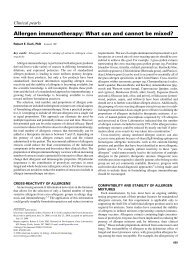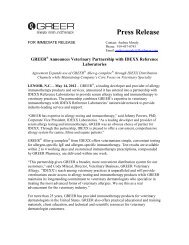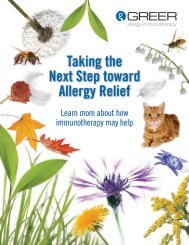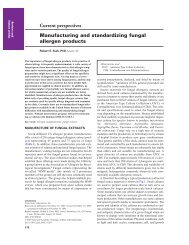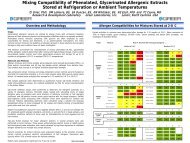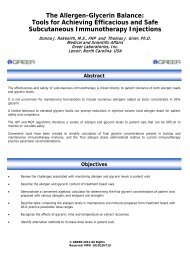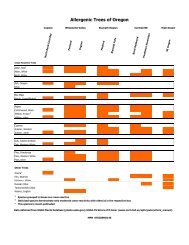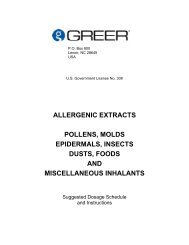Human Allergy Catalog - Greer
Human Allergy Catalog - Greer
Human Allergy Catalog - Greer
You also want an ePaper? Increase the reach of your titles
YUMPU automatically turns print PDFs into web optimized ePapers that Google loves.
WARNINGAllergenic extracts can elicit severe adverse reactions when improperly administered(see below under Warnings). Any person administering allergenic extracts should beexperienced in their use, aware of the risk of adverse reactions, and capable ofproperly handling such reactions.DESCRIPTIONEach vial contains an extract of Short Ragweed (Ambrosia elatior) pollen or ofequal parts Short and Giant Ragweed (A. trifida) pollen extracts. Extracts aresupplied in a buffered saline solution with or without glycerin (50%) added as astabilizer. Extracts are supplied as a sterile solution intended for subcutaneous orintracutaneous administration.Each lot of Short Ragweed extract or Mixed Ragweed extract is assayed forAntigen E content using a radial immunodiffusion test 1 employing known Antigen Estandards and anti-Antigen E antisera. Extracts containing Short Ragweed at aconcentration of 1:20 or stronger are assayed for Antigen E. Extracts more dilutethan this are not assayed but the Antigen E content is obtained by calculation basedon the Antigen E content of the concentrate.Antigen E, a protein with a molecular weight of approximately 38,000, has beenfound to be a major antigenic component of Short Ragweed pollen. 2,3 Antigen Econtent has been shown to correlate well with skin test reactivity of ragweedextracts. 4 For this reason, Antigen E content is being used to standardize ShortRagweed extracts in addition to the protein nitrogen content or weight to volumeratios as have been used.When transferring patients from non-standardized extracts to a standardized extract,it is advisable to compare the potency of the different lots by comparative skin testingusing the same concentrations of each extract. Marked differences in skin reactivitywill indicate differences in potency and the need to adjust dosages so as to avoidpossible severe reaction.CLINICAL PHARMACOLOGYControlled studies employing Ragweed extracts and Antigen E immunotherapy havedemonstrated an increase in Ragweed antigen-specific blocking antibodies. Thesestudies also demonstrated significant symptom amelioration in Ragweed allergicindividuals. 5,6 The total mechanism of immunotherapy is not yet known and is stillbeing investigated.INDICATIONSHyposensitization is indicated when careful testing and patient history can pinpointallergens responsible for allergic symptoms, and when it is not possible or practical toavoid these allergens. Allergenic extracts are administered to reduce symptoms ofallergy of a seasonal or perennial nature.



